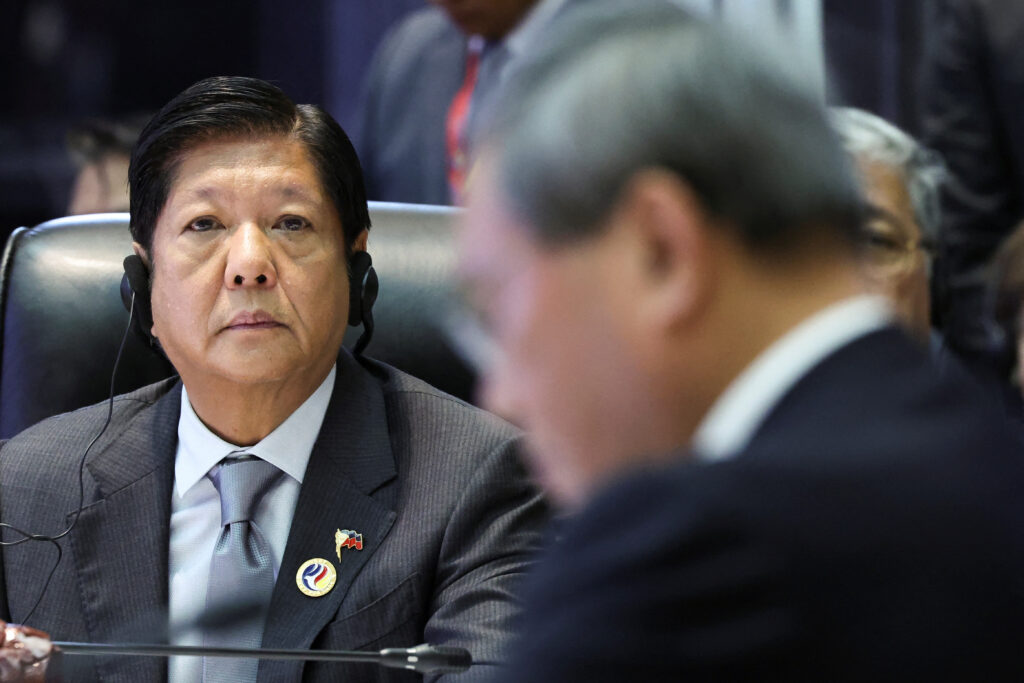
Philippines President Ferdinand Marcos Jr looks towards Chinese Premier Li Qiang as they attend the 27th ASEAN-China Summit at the National Convention Center in Vientiane, Laos on October 10, 2024. (File photo from REUTERS/Athit Perawongmetha)
MANILA, Philippines — Manila’s move to codify its rights and jurisdiction in the West Philippine Sea will likely be met with strong reaction from Beijing, analysts said on Friday.
President Ferdinand “Bongbong” Marcos Jr. on the same day signed into law two landmark bills – the Philippine Maritime Zones Act and Philippine Archipelagic Sea Lanes Act.
The Philippine Maritime Zones Act clarifies the geographical extent of Manila’s maritime domain and specifies the legal powers that the country may exercise over these areas.
On the other hand, the Philippine Archipelagic Sea Lanes Act ensures the protection of the country’s sovereignty and maritime domain.
Maritime expert Jay Batongbacal called these laws “foundational pieces of legislations,” which are aligned with the United Nations Convention on the Law of the Sea (UNCLOS).
Article continues after this advertisement
“It’s not only the Filipino people who are bound to comply with it but the international community as long as we implement our rules and regulations in accordance with UNCLOS,” Batongbacal said in an ambush interview during the Manila Dialogue of the South China Sea held in Taguig City.
Article continues after this advertisement
Security expert Chester Cabalza said the landmark laws will further draw more international support for the country’s claims as opposed to Beijing’s “ten-dash line.”
“Manila will gain more support from claimant-countries in the South China Sea and the international community in general, as the Philippines has shown the world how legal instruments can become potent force to persuade China to obey international laws to lessen overlapping claims,” Cabalza told INQUIRER.net on Friday.
Cabalza is president and founder of Manila-based think tank International Development and Security Cooperation.
Meantime, Bo Hu, director of another research group South China Sea Strategic Situation Probing Initiative, noted that the country’s maritime zone overlaps with Beijing’s claims.
“China and the Philippines have disputes on these claims. Of course, China will not like this kind of domestic law,” Hu also said in an ambush interview during the Manila Dialogue.
Manila is holding the line in the West Philippine Sea against pressures from Beijing as the Asian giant conducts what the Philippines deems as harassment against its maritime operations.
These operations are conducted particularly in Ayungin (Second Thomas) Shoal, Panatag (Scarborough) Shoal and Escoda (Sabina) Shoal.
The most violent incident occurred on June 17 which resulted in one navy personnel losing his finger.
However, Hu noted that the tensions in the contested areas are cooling down.
He expressed optimism that diplomacy can work to handle such differences.
“The good news is that the temperature in the South China Sea is going down, compared to last year, so I think Beijing and Manila can use diplomatic channels to manage the dispute,” Hu said.
“Actually, we can say that there is diplomatic progress to the Second Thomas Shoal and the Sabina Shoal,” he added.
Batongbacal, however, said Beijing should not see Manila’s legal move as an escalation.
“We did not expand our claims. We just clarified it because all our claims are based in the law,” he pointed out.
For comprehensive coverage, in-depth analysis, visit our special page for West Philippine Sea updates. Stay informed with articles, videos, and expert opinions.
